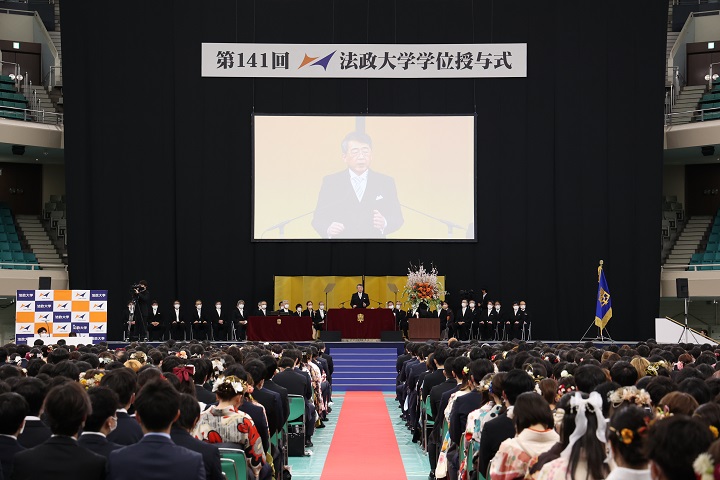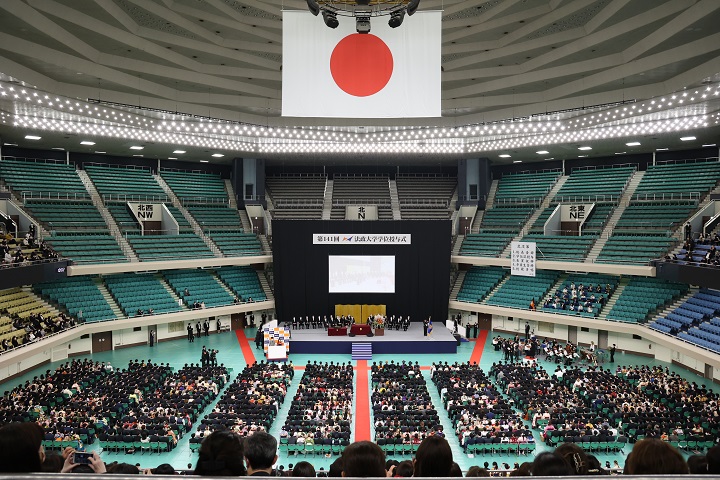News & Event
President’s Address to the March 2023 Hosei University Commencement Ceremony
I’d like to start by offering my sincere congratulations to all of you students here today and your families.
Those of you graduating from four-year undergraduate programs are the last cohort who have personally experienced student life both before and during the pandemic. So, does your life as a first year seem like a long time ago? Or, when you look back now, is it the spring of your second year, when the first state of emergency was declared, that feels more like the distant past? As we gather here today, face-to-face activities in the university have gradually returned to almost what they were before. Nonetheless, there has been a huge difference between the life you would have imagined when you joined the university and the life you have actually experienced. I’m sure that for all of you, that difference between expectations and reality is now etched in your memories.
Incidentally, it’s worth remembering that we’ve always lived our lives within the social context affecting society as a whole. That was the case up until 2019, before the pandemic, too. However, we don’t necessarily have any real awareness of this social context in the ordinary course of our lives. Under normal circumstances, the lives of university students in particular tend to be affected by social and economic changes only indirectly, as it were, and students have very few opportunities to really feel that they themselves are in the midst of a wider social context. Arguably, that is precisely why universities are places where students can settle down and learn without being unduly affected by changes in external circumstances.
Yet, the pandemic made all of us subject to wider circumstances, regardless of our age or situation, whether we were students, working adults, senior citizens, or children. We all found that what had previously been seen as normal could no longer be taken for granted, and things we had always achieved without much conscious effort could no longer be done in the usual way. We were constantly having to deliberately seek new approaches in order to achieve in some way the things we used to achieve. In a situation that was changing from day to day, we had to consciously choose our own personal priorities—the things we felt we really couldn’t give up—and tackle them in order, one after the other. Only then would we eventually manage to achieve some of what we wanted to achieve. I expect that during your time as students there were situations in which you had to prioritize in this way. Activities that took place outside the university campus, such as field work and overseas study in particular faced considerable restrictions, and no doubt there were some activities you were forced to give up. Even the things you did manage to do would have been possible only if you judged your timing well, prepared meticulously, and abandoned the usual way of doing things to adopt a carefully considered new approach.
At the same time, however, your student life under such constraints would have been full of opportunities to gain practical wisdom that you wouldn’t have experienced in normal circumstances. The activities you chose as priorities most likely indicate what you’re curious about and interested in, and what you really want to do. And using your ingenuity to think of novel approaches probably helped you make new discoveries and become aware of your own strengths in terms of your ideas and attitude. When the COVID-19 pandemic has eventually subsided, please don’t simply consign your experiences during this time to the past. Instead, I urge you to cherish these experiences and etch them in your memories as a chapter in your own personal histories; keep them with you always, as precious gifts you gained from the pandemic.
Now, for many of you, receipt of a diploma today will be a milestone that brings an end to the long school career you’ve followed ever since starting elementary school. But as is often pointed out, leaving school doesn’t mean that you stop learning. The social landscape is constantly changing, and science and technology are advancing rapidly. To be alive is to be confronted by these changes day after day and to experience their effects both directly and indirectly. Remember also that you yourselves are protagonists who create such change one way or another. So, some form of continued learning will be required of you by others, and there will be occasions when you yourself will feel the need to learn. Even if your schooling is over, your education is not.
However, once your school days are over, learning differs greatly from school-based education in at least two respects. The first is that you’re no longer provided with a curriculum and set a course that requires you to do certain things within a specific timeframe. Of course, suitable curriculums are essential in order to learn things in a systematic way, and even in society at large a wide variety of curriculums have been developed and made available. From now on, however, it will be up to your own judgment and discretion to seek these out and choose the best options.
The other difference you will experience relates to study companions. At school you learn with people whose interests are the same as yours. But in the wider society, you’ll need to make a conscious effort to encounter others who share your interests and want to learn the same things as you. The environments in which you find yourself won’t provide you with ready-made study companions. You’ll need to actively seek out such people and create opportunities to learn together. Even if you don’t actually collaborate on your studies, and despite the fact that learning is by its very nature a solitary pursuit, there’s much to be said for having study companions. No doubt many of you sensed this during your time as students, but in fact you will probably feel it all the more keenly once you’ve left the university.
These are just two of the ways in which you students who are leaving the school system to go out into the world will need to become more independent learners than you’ve been during your school days. The most important thing you can master at university—a higher educational institution—is how to actually acquire knowledge. The real value lies not so much in what you studied at university, but in the fact that you mastered how to study, and are now able to acquire whatever other knowledge you need whenever you need it. Today you are graduating not from studying, but from learning how to study. Let this be the first step on your path toward genuinely independent learning in future.
However, I’m not saying that you should learn entirely on your own for the rest of your lives. Universities can help if you want to consolidate what you’ve already studied in a systematic way, or you want to find out which curriculums are reputable and effective in order to start studying something new. I strongly recommend that you make use of universities in this way from time to time over the course of your lives. There are all kinds of universities throughout the world, and they offer a diverse range of learning opportunities. I sincerely hope that your alma mater, Hosei University, will be one of the options you consider when the need arises.
I wish you all a brilliant future, and look forward to the opportunity to meet some of you again in the years to come. Congratulations!



